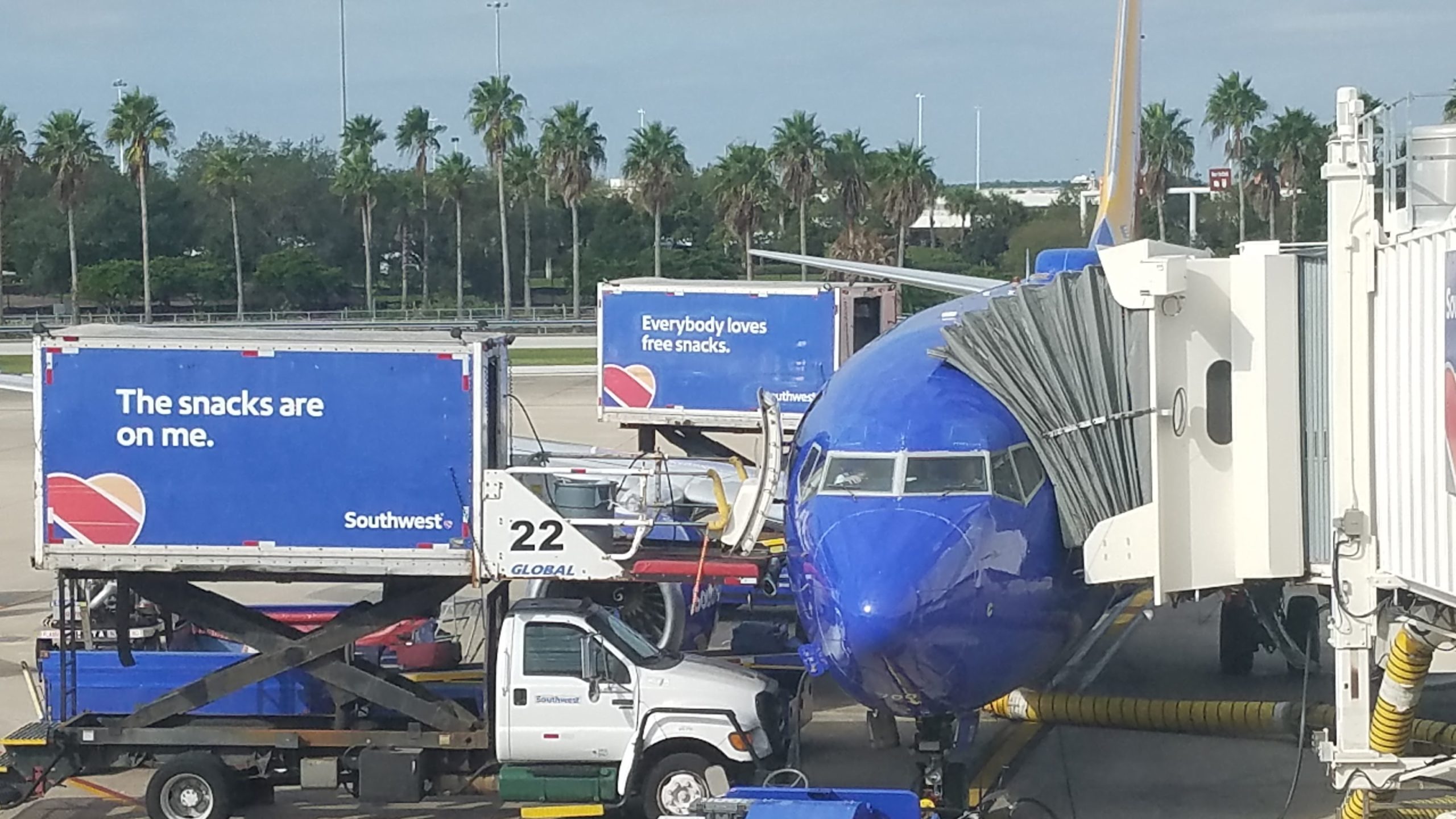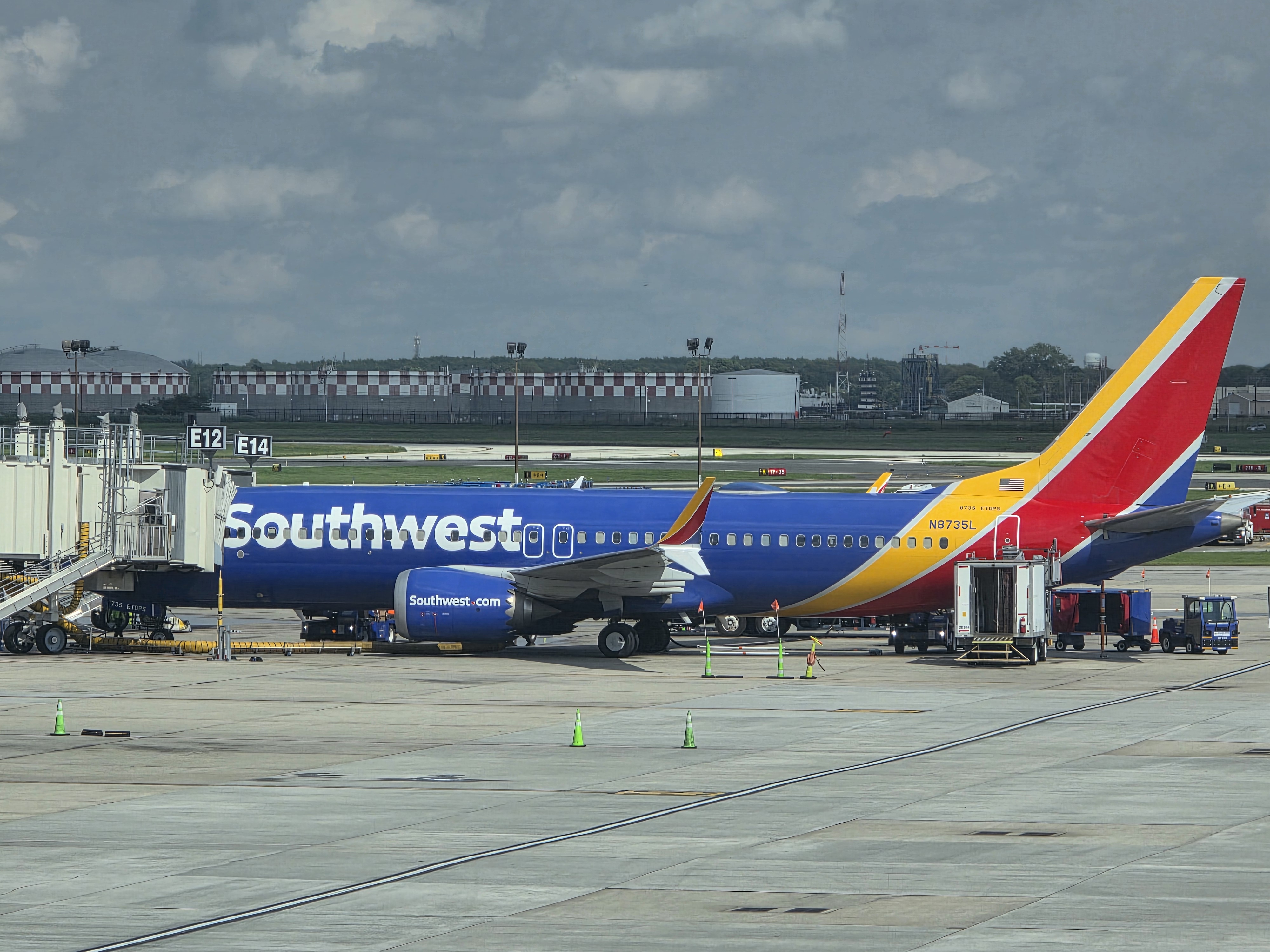“I had a few light beers last night,” Southwest Airlines captain David Paul Allsop told police at Savannah/Hilton Head International Airport after TSA officers said they could smell alcohol on him. Minutes later, body camera footage shows officers stepping into the cockpit of his Boeing 737, telling him he wasn’t flying, and leading him away.
On January 15, 2025. 52-year old Allsop was scheduled to pilot Southwest Airlines 3772 to Chicago Midway. While passing through the airport’s TSA checkpoint, screeners reported the smell of alcohol and contacted airport police.

Officers met Allsop at the aircraft before passengers boarded, told him about TSA’s concern, and asked him to step off. They also asked if he was carrying a firearm. He said no.
In the newly-released body cam video, one officer tells him, “We can smell the alcohol on you from here.” Another explains FAA alcohol rules:
- pilots cannot have a blood alcohol concentration of 0.04 or higher
- cannot consume alcohol within eight hours of a flight (‘8 hours bottle to throttle’)
- cannot act as a crew member while under the influence.
The officer adds, “You’re not flying today.”
Shocking! Southwest Airlines pilot David Allsop allegedly removed from cockpit after smelling of alcohol. Arrested under DUI charges… flight canceled! Southwest acted fast, pulling him from duty. pic.twitter.com/l4gN1iKBzy
— Fahad Naim (@Fahadnaimb) August 14, 2025
Allsop agreed to a field sobriety test on the jet bridge. Police say he did not pass. Officers then placed him under arrest. He was walked back down the jet bridge in handcuffs, past crew and ground staff.
The Chicago-bound Boeing 737 remained at the gate until Southwest could find a replacement pilot. The flight eventually departed nearly five hours late. Allsop was booked into Chatham County Jail with bail set at $3,500. The case had been forwarded to the U.S. Attorney’s Office for federal prosecution.
On March 12, 2025, the FAA revoked Allsop’s pilot license, which became public in July. Southwest confirmed then that Allsop was no longer employed by the airline.

Air travel can be a difficult career and drinking and other substance problems get hidden. Pilots with substance abuse problems are often wary of speaking up and seeking help, for fear of being sidelined, despite programs designed to encourage them to do so.
Pilots hide not just alcohol abuse but mental health conditions and that points to a fundamental conundrum: you want pilots to be open and seek help in order to promote safety, but once they’re open they’re a clearly identified risk and get removed from the cockpit. So the consequences of being open discourage that openness. Or at least that’s the fear many pilots have, not trusting any commitments to help rather than punish.


Bad pilot, bad! (Good news, @Tim Dunn, it wasn’t Delta this time! Phew!)
So, if we had EU261-style regulations, those passengers would be compensated for the cancellation, in addition to rebooking/refund, because this is a staffing issue (the airline doesn’t have a pilot eligible to fly at the scheduled time of departure). Instead, it’s ‘sowie’ and ‘deal with it’ for those sucker who choose to trust Southwest. Sad. ‘Thank you for your attention to this matter!’
@1990: why compensation needed? The passengers were treated to a show most of us, thankfully, will never see. That is worth the price of admission.
Southwest Airlines has become the new Spirit Airlines, minus the daily Florida departure gate brawls.
@Ray — Priceless.
Dude doesn’t seem drunk in the slightest. Maybe he pissed someone off at TSA.
Ken A. – The brawls are surely forthcoming. Southwest has been deliberately morphed into Southworst.
1990
I relish no one’s bad fortune whether they are a DL competitor or not.
Too many of these incidents happen at all airlines.
being a pilot (and FA) is a hard career; constantly being in different beds, being subjected to delays, having short turnarounds during which you are expected to get rested – go from 60 to 0 and back in 9 hours or less.
Many people do use alcohol under those conditions and have built bodies that cannot turn it off in time.
I mourn to hear stories like this because of the broken lives.
It happens throughout society but we hear it here because it involves pilots. FAs do it but likely get caught far less. If the TSA tested FAs, the numbers would be much higher than for pilots.
@Tim Dunn — Well said, sir. (And, agreed, no ‘relish’ on my hot dog.)
Well said indeed, @Tim Dunn.
To clarify for anyone who got deja vu like me, this incident did happen several months ago which Gary made a post on, but the footage was just released.
The guy admitted to having at least three beers the night before. I would wager more but even three beers when you have to fly the next day is nuts. The guy is 15 years from retirement and is going to do what now for a living? You could tell in the video that the FO was in a state of shock and disbelief.
Gary,
Appreciate the way you posted this. Not inflammatory, factual, and explored some of the underlying issues. Well done.
A sad story. I don’t know what programs the airlines have to treat their employees with mental issues or incipient physical addictions before these reach critical stages, but hopefully they are willing to invest in that. NASA does have a program where mechanics and pilots in any type of commercial or private aviation can report safety issues without fear of penalty, and the more interesting ones are published every couple of month. (“Callback” from the Aviation Safety Reporting System) It is interesting but even after reading it for many years I have yet to see substance abuse mentioned.
Indeed, a sad story. Most airlines have a program that if a pilot admits a problem or accepts an intervention PRIOR to boarding the aircraft, the company will help in every way possible to get this pilot/flight attendant, whomever, sober and clean. I witnessed, first hand, the day the chief pilot of a pilot’s airline called to inform a pilot that he completed the program and started recurrent training the following Monday. There were a LOT of tears of happiness. However, once stepping over the threshold of the jet, things are not as “pleasant”. When this individual refused a blood draw, that indicated that he knew he was wrong. Granted, he has that right but… I read of one pilot that was accused of being drunk prior to push back. Not only did he insist on a sobriety test, he passed with flying colors but then refused to fly the trip because of the perception that the rest of the crew and passengers would infer. I agree with him 100%. In checking government records, Captain Allsop now has NO medical and NO pilot certificates. OOPSEE!
Criminal case is going nowhere unless a breath or blood sample comes out over the limit. Officer literally says “I didn’t really see it on walk and turn, but I saw nystagmus.” Unless arresting LEO is a certified drug recognition export (less than 1% of cops are), he won’t be able to testify about nystagmus. And the pilot apparently did well enough on the one legged stand, too.
Which brings me to the bigger point: If a cop asks you to do field sobriety exercises, 99% of the time the cop has already decided they’re going to arrest you. They just want to try and collect more evidence to support that decision via FSE’s.
They guy is an alcoholic has completely lost control of his life. They fact he has so much alcohol tolerance he doesn’t “appear” to be drunk is irrelevant.
Field Sobriety Tests, as noted above, they’re taught in Cop School: take nine steps, heel-to-toe, along a straight line, turn on one foot and return nine steps in the opposite direction. You can’t do it on flat, level floor, much less on (usually) an unpaved side of the road with traffic flying by. And, stand with one foot about six inches off the ground and count from 1,001 (one-thousand-one, one thousand two, etc.) until the officer says to put the foot down. During the next 30 seconds, the officer looks for these four indicators: Hopping to maintain balance, Putting the foot down, Swaying while balancing, Using arms to balance. You can’t do it. But, neither can the cop. Lars writes about the third test. Breathalyzer: intended to measure deep-lung alcohol levels. BUT, usually at least an hour between arrest and test, takes time for alcohol to be metabolized. What’s measured isn’t what was there at the time of the first encounter.
He was N O T walked back down the jet bridge in handcuffs, past crew and ground staff. Officers enever handcuffed him at all
What am I missing here. I’m assuming that he was found intoxicated by way of a breathalyzer test or blood test. To me he looked fine in a video which you did not comment on. Was he found guilty and do we know what the blood alcohol level was. Or are we pre-judging A lot of inferences here without actual facts!
To Lars, the FAA has revoked his pilot certificates and the medical. That would be issued by a federal administrative law judge. The date of his medical is blank and the certificate are listed as NONE. He be SOL as a pilot. Even if he were to reapply, no airline would hire him.
To Ro, he was handcuffed when he was placed in the patrol car. Implied consent laws apply to pilots as well as any other vehicle. Refusal to submit to such testing can lead to license suspension or revocation, among other penalties. There was a joke circulating many years ago after a pilot was arrested for flying under the influence. “How many pilots does it take to fly a plane a XXX airline? “Two and a fifth!”
@ David R. Miller — Yes, your beloved Southwest sucks, as it has for decades. Please don’t change airlines.